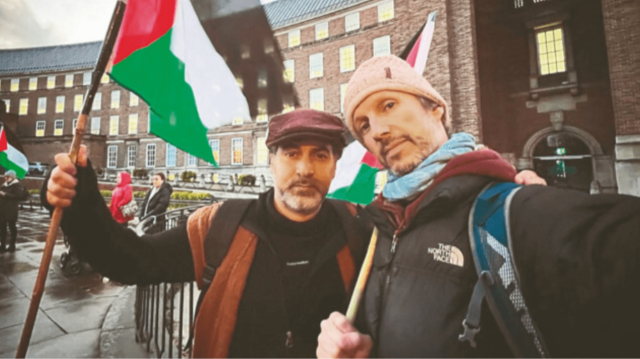
British music band The Undercover Hippy recently went viral with a song they penned for Palestine. Last month, the video for their song "We Are Not Numbers," shared on the band's social media account, reached a wide audience.
Holding his guitar and singing “We Are Not Numbers,” the band's lead singer Billy Rowan passionately highlighted the oppression in Palestine, touching the hearts of hundreds of thousands with his emotional lyrics. Yeni Şafak spoke with Rowan about the video, the song, and the stance of British artists on Palestine, in which he remarked, "If you’re not crying when you think about Palestine, you don't really know a thing about Palestine."
I started writing the song in 2014 during Israel's bombing of Gaza. I wrote the chorus but shelved the work for a while because I couldn't fully express what I wanted to say. When the bombings started again on October 7, I felt I had to finish the song. I completed it in January this year. Seeing the support for "We Are Not Numbers" and how many people connected with the song made me happy.
I first performed it solo on a tour in the UK. Then we performed it in many places between March and May. Honestly, I was nervous back then because talking about Palestine in the UK gets you labeled as antisemitic. In the following months, this view changed. People started singing the song together. The video we posted on social media was shot with my manager's cell phone during one of our concerts. Since the sound quality of the song was good, I decided to publish it. People criticized me, asking, "Why are you posting this? Do you love Hamas?" Some didn't comment out of fear of criticism. Seeing the video being shared in different countries surprised and pleased me.
No, I didn’t. But one of my concerts in Germany was canceled because I was accused of being antisemitic. They cited not my song but the fact that I posed with a Palestinian flag at a ceasefire march in London as the reason.
Writing the song was really tough. I was writing about why I couldn't cry while watching images from Gaza in 2014. After October 7, I started working on the song again. But this time, I began to cry while singing it. Then I thought, ‘This is a good song. If it makes me cry, it will make others cry too.’ I practiced singing it repeatedly until I could do it without crying. It’s been an unusual recording process. Right now, the drums, bass, and guitars are recorded. After recording the vocals and backing vocals, it will be completed in the next few weeks. Then we’ll set a release date.
We’re working with a woman from Brazil to feature a family from Gaza in the video. Later, we thought it might be a bad idea due to the many problems people in Gaza are dealing with. When the woman explained the situation to her friend in Gaza, he said, "My daughters can’t go to school; they do nothing all day. It would be great for them.” We’re working on a video from my home with a woman in Brazil and this family in Gaza.
I attended a few ceasefire marches in London. The last one we attended was on July 5. It was quite impactful. Recently, musicians in the UK took significant action. They announced they would withdraw from festivals sponsored by Barclays, a bank making substantial investments in Israel unless the bank ceased its sponsorship. I think five festivals dropped Barclays as a sponsor. It’s inspiring to see musicians acting together. But the number of people speaking out is less than I hoped because many musicians fear talking about these things and not getting booked for concerts.
*Writing by Halime Kirazlı
Hello, the comments you share on our site are a valuable resource for other users. Please respect other users and different opinions. Do not use rude, offensive, derogatory, or discriminatory language.
The floor is all yours.








